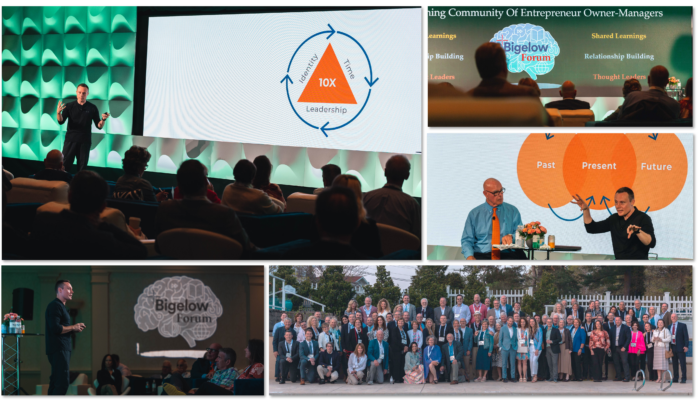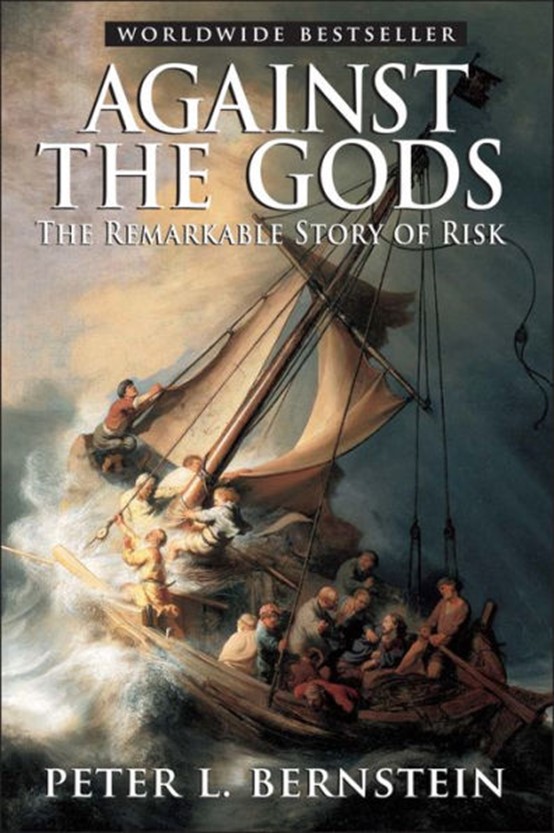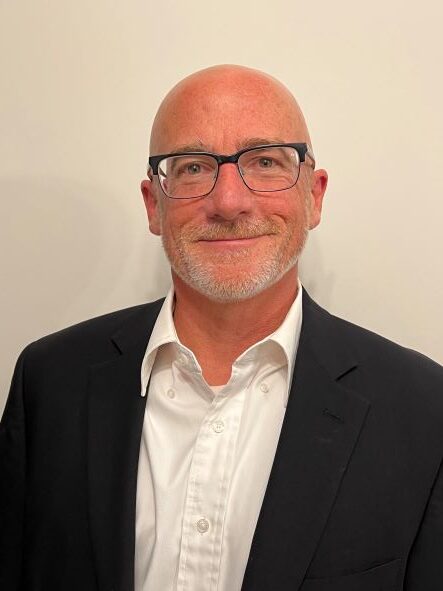3 minute read
Portsmouth
At Bigelow we work exclusively with high-performing Entrepreneur Owner-Managers (EOMs), so our sample size is narrow and deep. They are Principals not Agents. They have skin in the game: meaning, legacy, and the potential loss of capital (not merely loss of upside). Most of them created this legacy and fortune themselves, and take most of their sense of purpose, meaning, identity, relationships, activities, joy, regret, challenges—you get it—from it. We find about 50% of them are Founders and 50% Family Businesses.
On Thursday, May 11th at the 2023 Bigelow Forum, our friend Dr. Ben Hardy challenged this year’s participants (exclusively EOMs of high-performing businesses) by describing the main idea of his book Be Your Future Self Now, an innovative concept based on the premise that the way you define and dimension your Future will allow you to have a "great Present," and a “great Past.” Or, how if you haven’t done the work to redefine your Past as a great Past, then it’s challenging or not possible to have an amazing Future. Ben called on the foundational research of Dr. Dan Gilbert, the Edgar Pierce Professor of Psychology at Harvard University. In Gilbert’s ten-year long study called “The End of History Illusion,” he defines it as the paradox where you realize that even though you have changed a lot over the years, your mindset when making goals is that you make them for who you are today, instead of who you’ll be five years from now when you are trying to realize the goal.
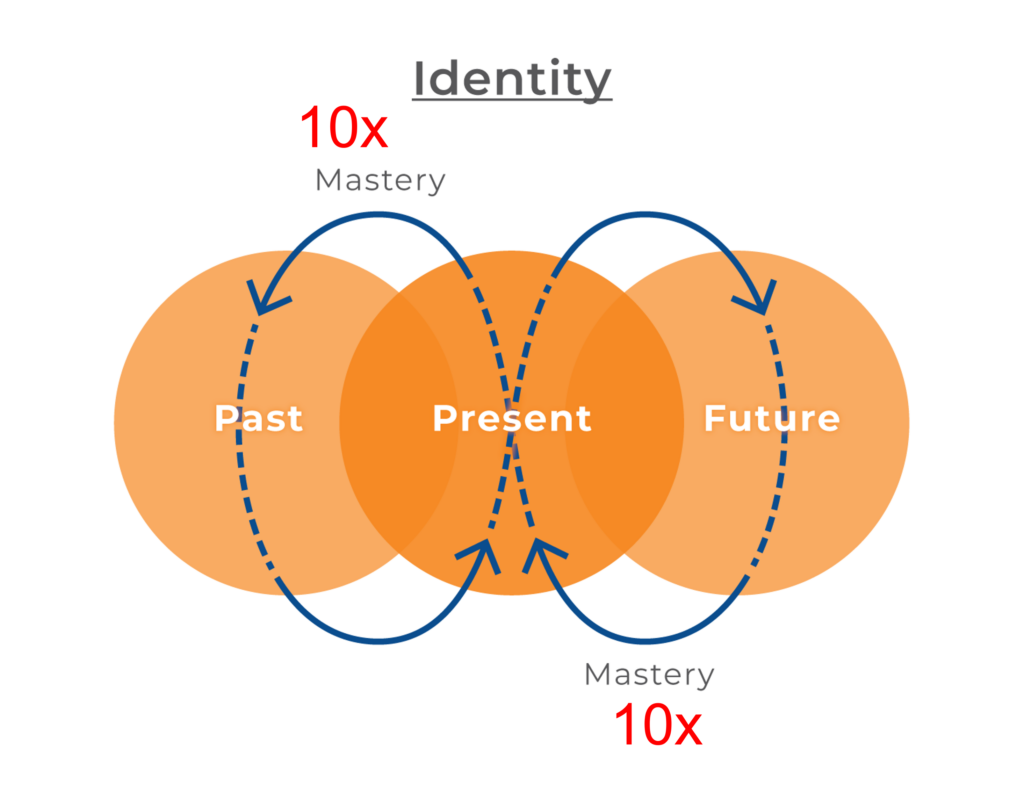
Copyright 2023 Dr. Benjamin Hardy – Past, Present, Future Identity Model.
We know that Entrepreneur Owner-Managers are tireless freedom seekers, independence seekers. They are creatives—being an EOM is a creative act. That’s usually why they did what they did professionally—consciously or unconsciously, they were literally constitutionally un-able to conform to the crowd and so, struck out on a different path. They “think different” is a specific thought made famous by Steve Jobs. They are independent critical thinkers. They typically deliver massive value to the domains they are in. But, over time, it can be an isolating place, lonely even.
"Here’s to the crazy ones, the misfits, the rebels, the troublemakers, the round pegs in the square holes… the ones who see things differently — they’re not fond of rules… You can quote them, disagree with them, glorify or vilify them, but the only thing you can’t do is ignore them because they change things… they push the human race forward, and while some may see them as the crazy ones, we see genius, because the ones who are crazy enough to think that they can change the world, are the ones who do."
— Steve Jobs, 1997
Have you noticed (we have) that giving an organization “your all” for 10, 20, 30 years can begin to feel like it owns you instead of you owning it? Freedom and independence—the reasons we became an EOM—may decline (whoops). It may be that after an intense period of time leading our enterprises, that a certain routine settles in for a particular course that may feel like we will depart from again and may persevere for the rest of our lives. On Friday morning, our panel of experienced high-performing EOMs who have already been through a capital gain transaction, shared with us their planning (or not) to become their future selves now. And how they thought about that before their transaction and whether the transaction brought them closer to achieving their goals in the future. The panel included Ken Johnson (MAS Medical Staffing), Janet Farris (Total Label), and George Mock (Nye Lubricants). Each of them had a different story to tell with different levels of preparation on becoming the future self now.
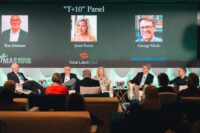
As seasoned, high-performing EOMs we find ourselves on a road that is not easily left, feeling the heaviness that our constituencies, families, employees, colleagues, communities are counting on us to continue to make the enterprise successful (for them). It may begin to feel like a big responsibility, a preoccupation, it wears a groove in us. Sometimes the groove gets deeper and deeper until the accretion of qualities now belong to a character we don’t even recognize. It can be curious—heartbreaking even—how these EOMs previously habitual cheerfulness and zest can wane; their gaiety of mind, natural free-springing joy disappeared. Authority I think is its great enemy—the assumption of authority. No one who is an owner-leader of a significant enterprise seems to be entirely carefree, effectively none who have had to long exercise responsible leadership.
So, our conversation with them usually begins around their desire for freedom and independence and their lack of it. Originally, they set out on the entrepreneur path to achieve freedom and then over time, unintentionally added complexity to their lives putting handcuffs on their time, relationships, activity, and sometimes ultimately, …purpose. They are often impatient to get onto the next chapter.
Outsiders nominally see the results of Bigelow’s work in the form of transaction announcements that ABC Company acquired DEF, or XYZ Private Equity Group recapitalized that. We don’t see it that way. What we see is that we are helping EOMS to unlock a transformative event in their life. The experience our clients have in their work with us allows them to go onto the next chapter they so desperately want, their success fueled by the fortune that they have built and just realized. These people are not Silicon Valley “start up to sell out.” That’s not even a concept most of them would understand.
At the 2023 Bigelow Forum we quoted author Esther Perel from her book Mating in Captivity, “Can we desire what we already have?” Is that true for us with our enterprises? We are grateful for what we have created together but after 10, 20, 30 years there can be a languishing, a fading of energy that fueled us with the life force that allowed us to create, lead, and guide our organizations for the last years. We can be grateful for what we have, but also acknowledge and long for what we don’t have. Freedom. Positive Energy. Independence. You can have a relationship with your enterprise that “isn’t dead” or you can have a relationship with it that is alive—in flow—with so much yet to unlock, discover, to live, to breathe, to connect with people. It takes challenging inner work. Usually with lots of ups and downs. Transformation: is a journey, not a moment.
As a lasting thought exercise as part of the 2023 Forum, Ben Hardy asked participants to write a brief one-page letter of advice from their Future Self (in 2028) to their Present Self (2023) employing what our Future Self knows about us, and the future environment. The point is to identify how we can achieve those future goals beginning now. We worked on that and then some of the Participants generously shared their letters to their Present Self from the Future Self.
So why do people who love their enterprises continue to long for the next chapter? They don’t want to leave the organization they created, but they want to become the different person that they sense they have potential to become, but haven’t been able to become after 10, 20, 30 years of creating and building enterprise.
(Sometimes a change in ownership allows people around the EOM to topple the scoreboard too. You want to unlock your own potential and you will most likely find, that is what other members of your team want too. It allows a reset of the power-dynamic. “You think I want to get stuck in this role with you where I am the Owner forever?”)
At the 2023 Bigelow Forum we validated: EOMs may appear to want achievements, but what we really want is freedom, self-determination, liberty.
What I am Reading / Listening to
Against The Gods: A Remarkable Story Of Risk (1996)
By Peter L. Bernstein
Peter L. Bernstein's book, "is an engaging and thought-provoking exploration of the history and evolution of the concept of “risk”—as different from uncertainty (for those who are interested, Bernstein would say that an “uncertain” event is unknowable and therefore you cannot assign a probability to it, while risk is where you can assign a probability of an event). Bernstein takes us on an interesting journey through time and space, exploring the ways in which humans have grappled with the concept of uncertainty and how they have attempted to manage risk throughout history.
I am guessing that one of the strengths of this book is its accessibility. Despite the complexity of the topic, Bernstein presents his ideas in clear and concise language, making the book suitable for readers with different levels of familiarity with the subject matter. The book is also well-organized, with each chapter building upon the previous one to create a cohesive narrative that covers a wide range of topics related to risk.
Another feature of the book is Bernstein's “consilience”—his ability to connect the dots between seemingly disparate fields and disciplines. He seamlessly weaves together ideas from economics, psychology, philosophy, and history to provide a holistic view of risk that goes beyond the narrow focus of many other works on the subject.
The book can be a bit heavy on the history at times, which is fun for me but maybe not for every reader. Some readers may find the extensive use of historical examples to be a bit overwhelming or uninteresting. However, for those who are interested in the historical context of risk, Bernstein's book provides a wealth of information and insights.
Overall, Against the Gods is an essential read for anyone interested in understanding the role of risk in our lives and in society as a whole. It is a thought-provoking and insightful work that challenges readers to think more deeply about the risks we face and how we can best manage them.
Entrepreneur Owner-Manager Quote
"I felt alive. I felt more alive than I had felt in years.”
© 2024 Bigelow LLC. All rights reserved.

